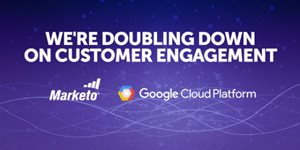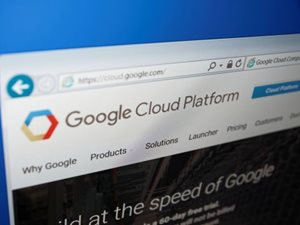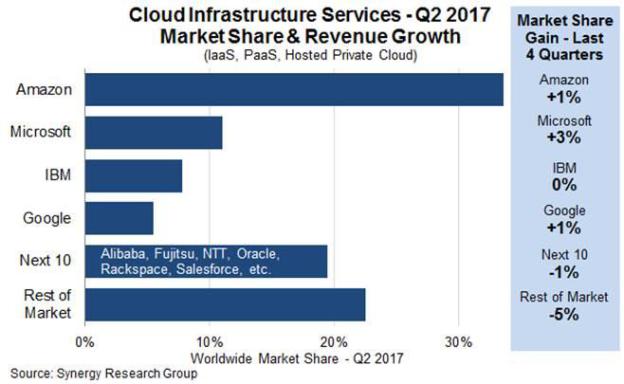Is a Marketo/Google Partnership A Game Changer for Enterprises?
Last week, Marketo Inc, a cloud marketing solutions platform provider, announced a multi-year  collaboration agreement with the public cloud giant Google Cloud that will see the vendor migrating its infrastructure to the Google Cloud Platform, meaning that all running of Marketo’s products, end-to-end, will be delivered out of a third-party cloud. Marketo expects to be fully migrated off its own servers and onto Google's cloud before 2019.
collaboration agreement with the public cloud giant Google Cloud that will see the vendor migrating its infrastructure to the Google Cloud Platform, meaning that all running of Marketo’s products, end-to-end, will be delivered out of a third-party cloud. Marketo expects to be fully migrated off its own servers and onto Google's cloud before 2019.
As part of a six-year alliance, Marketo, which was sold for $1.79 billion to the finance company Vista Equity Partners, will integrate its engagement platform with Google's G Suite and data analytics. From Marketo’s perspective, the use of its engagement platform internally at Google will be accelerated while leveraging Google's machine learning capabilities. Aside from the technical compliance between the two technologies, Google's advertising products and relevance to marketers made the cloud provider a better fit comparing its rivals.
More importantly, the vendor will take advantage of Google’s scale and infrastructure to further develop and deploy product innovation more rapidly. While Google with its Cloud Platform has made considerable strides for service reliability and value for money/cost, Marketo has been struggling with the reliability and performance problems in recent years. To tackle this issue, the marketing automation platform provider unveiled "Project Orion," last year which marked the largest tech investment by the vendor in its 10-year history. When Marketo’s Project Orion was first announced, Phil Fernandez, Marketo's Chief Executive Officer, claimed that the platform is mainly designed to help organizations "lay a digital fabric across the whole enterprise". However, scaling the platform to cope with enterprise-grade, real-time operations has been a challenge for the vendor. Therefore, Google’s engineers are expected to provide expertise to address this performance issue.
What's In It for Google Cloud?
From Google’s standpoint, this deal marks a major win for Google's cloud offering as the  vendor is one of the leading marketing automation companies alongside Salesforce and Oracle's Eloqua suite among others. On the other hand, the top four providers and their cloud offerings - Amazon Web Services, Microsoft Azure, IBM Cloud and Google Cloud Platform - collectively controlled 53 percent of the market in the second quarter of 2017, leaving the rest to fight it out for the remaining 47 percent, according to Synergy Research. It is worth noting that Google alongside Microsoft is seeing high overall adoption rates since 2015. Additionally, this partnership will allow Google to have a leg up on the cloud infrastructure competition against Amazon, Microsoft, and IBM, considering Marketo claims to have more than 6,000 businesses as customers of its marketing automation products, including large enterprises such as GE Healthcare and Panasonic.
vendor is one of the leading marketing automation companies alongside Salesforce and Oracle's Eloqua suite among others. On the other hand, the top four providers and their cloud offerings - Amazon Web Services, Microsoft Azure, IBM Cloud and Google Cloud Platform - collectively controlled 53 percent of the market in the second quarter of 2017, leaving the rest to fight it out for the remaining 47 percent, according to Synergy Research. It is worth noting that Google alongside Microsoft is seeing high overall adoption rates since 2015. Additionally, this partnership will allow Google to have a leg up on the cloud infrastructure competition against Amazon, Microsoft, and IBM, considering Marketo claims to have more than 6,000 businesses as customers of its marketing automation products, including large enterprises such as GE Healthcare and Panasonic.

According to the graph above, the Google Cloud Platform is the fourth-largest cloud infrastructure services provider, with an estimated market share of about 5 percent, which represents a 1 percent growth in market share over last year. Even though Alphabet, the parent company of the Google Cloud Platform, does not share the financial data for its cloud business, it is included in Google's "other" business, which the company in July said grew about 41 percent over that of last year to $3.1 billion.
Google has been lacking the enterprise sales touch that powers Amazon Web Services and Microsoft. The company will tackle that issue with this deal as Marketo will bring Google the missing engagement platform piece.
"Both Marketo and Google Cloud are dedicated to helping customers achieve their goals with smart solutions," says Tariq Shaukat, President at Google Cloud. "This collaboration will allow for innovation leveraging Marketo's Engagement Platform and Google Cloud's commitment to performance, collaboration, and data science at scale."
Nan Boden, head of global technology partners, Google Cloud, said in a blog post: “Our relationship with Marketo demonstrates Google Cloud’s commitment to deep collaboration with leading SaaS companies (Evernote and Box) by providing the best public cloud platform to host their applications, leverage machine learning, and data analytics and integrate with our productivity suite.”
This announcement came a month after Marketo unveiled its latest suite of product capabilities which is built into the Marketo Engagement Platform to empower marketers to create more personalized and authentic cross-channel experiences for their buyers through its new features such as LinkedIn Lead Gen Forms Integration, Web Personalization Campaign Enhancements, ABM engagement functionalities and Marketing Performance Insights.
My POV
Marketo built its fast-growing business on selling to small and mid-market accounts which kept it largely off the radar of its biggest rivals for years, and now the cloud-based engagement marketing software platform provider has been trying to expand its audience to the enterprise-level customers.
Despite the huge investment in its product line to leverage digital experience, Marketo’s platform was still slow at times when merging duplicate records, pulling smart lists, exporting lists, and creating reports in RCE. The industry insiders have been stressing that if Marketo wants to gain a share in the large enterprise market, these low latency issues should be fixed. Even though Project Orion was launched to tackle that issue, some have stated that they haven’t experienced a big change since Orion was rolled out. Therefore, the partnership with Google may move the needle by improving Marketo’s capabilities significantly, with dynamic performance and speed. This deal will not only help Marketo scale its platform but also free up the vendor’s resources to manage more essential, innovation-focused processes which are extremely important for Marketo in a world of over 5,000 marketing technology vendors.
More and more enterprises are embracing the cloud shift for cost optimization and increased competitiveness. Marketo has been known for very high operating expenses so another gain that consumers may obtain from this alliance is lowered costs.

Venus Tamturk
Venus is the Media Reporter for CMS-Connected, with one of her tasks to write thorough articles by creating the most up-to-date and engaging content using B2B digital marketing. She enjoys increasing brand equity and conversion through the strategic use of social media channels and integrated media marketing plans.